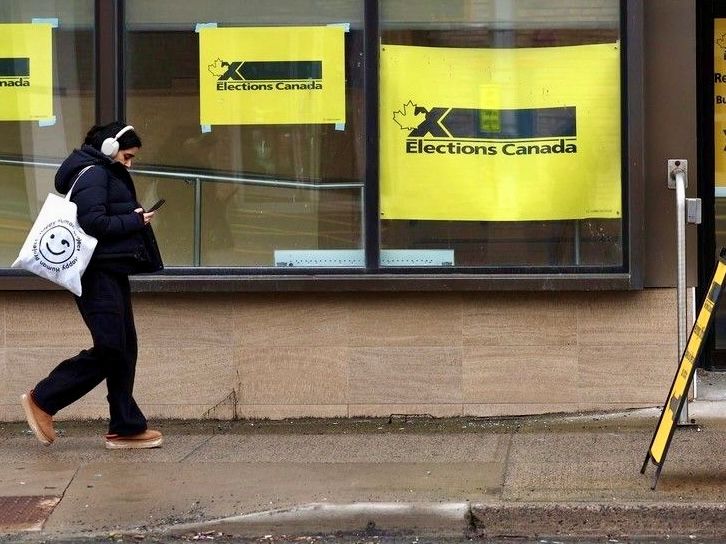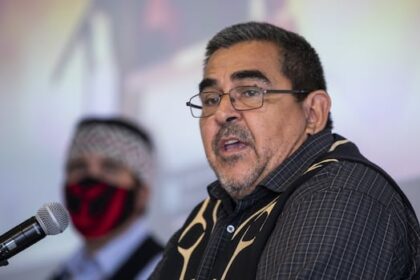Published Apr 22, 2025 • Last updated 12 hours ago • 3 minute readElections Canada reported that an estimated 7.3 million people voted in advance polls from April 18 to 21. Photo by Tim Krochak / The Chronicle HeraldA record 7.3 million electors voted in federal election advance polls across Canada over the Easter weekend.Elections Canada data showed the turnout was up 25 per cent from the advance poll numbers (5.8 million) from the 2021 federal election.The advance polls were open from Friday through Monday. Elections Canada noted the overall number is an estimate as some polls have not been reported.THIS CONTENT IS RESERVED FOR SUBSCRIBERS ONLY.Subscribe now to access this story and more:Unlimited access to the website and appExclusive access to premium content, newsletters and podcastsFull access to the e-Edition app, an electronic replica of the print edition that you can share, download and comment onEnjoy insights and behind-the-scenes analysis from our award-winning journalistsSupport local journalists and the next generation of journalistsSUBSCRIBE TO UNLOCK MORE ARTICLES.Subscribe or sign in to your account to continue your reading experience.Unlimited access to the website and appExclusive access to premium content, newsletters and podcastsFull access to the e-Edition app, an electronic replica of the print edition that you can share, download and comment onEnjoy insights and behind-the-scenes analysis from our award-winning journalistsSupport local journalists and the next generation of journalistsRegister to unlock more articles.Create an account or sign in to continue your reading experience.Access additional stories every monthShare your thoughts and join the conversation in our commenting communityGet email updates from your favourite authorsSign In or Create an AccountorArticle contentMargaret Chapman, COO with Narrative Research, said the high advance poll turnout is encouraging ahead of next Monday’s federal election.“There’s a couple of different points of view,” Chapman said. “People say because this election matters, more and more people are interested and want to get the vote out.“It could also indicate that people want to get ahead of the curve and not wait in line on election day. For the good of democracy, I hope it’s indicative that more people are going to vote this election.”On Tuesday, a nationwide survey by Narrative Research and the Logit Group found that Canadians overwhelmingly listed the cost of living as their main concern heading into this election.Seventy-two per cent of respondents to the survey said the cost of living was their biggest concern. The response is up five per cent from a similar March survey where 67 per cent listed it as their main issue.Chapman said the research shows that people are experiencing hardship with the day-to-day costs of living.Article content“As I look through the issues that were identified, there’s a lot of tangential issues related to cost of living that even make that more acute,” Chapman said of the survey that was conducted between April 9 and 12. Over 1,200 Canadians 18 years of age or older were polled.“Thirty per cent of people said housing affordability is the most important issue so that’s very much related to the cost of living because housing is one of the biggest components of what people spend every month. There is also poverty alleviation, which was mentioned by eight per cent, income support was mentioned by six per cent and then more broadly, improving the economy, a third of people mentioned that.“You take all of that together, on top of the fact that the cost of living came out on top as the most important issue, it really sends the message that overall people are struggling with their daily finances.”Chapman said the cost-of-living issues are at the top of people’s minds across the country, especially those under the age of 55.Article content“It’s what people are listening to when they are thinking about the answers candidates are giving and how it is going to help me make my life more affordable,” Chapman said.“The interesting thing is that it doesn’t vary across the country at all in terms of region, or province, but it does vary by age. Older people, those 55 and up, are much less likely to mention the cost of living as a key issue. They are more interested in the response to the U.S trade war and more interested, not surprisingly, in health care as a top issue.”The United States trade war and tariffs were considered the next biggest issue at 49 per cent, down four points from March. Other hot-topic issues were health care (39 per cent, up three points) and improving the economy (32 per cent, up two points).“Not to diminish the U.S. trade war and tariffs, which half of people identify as a top issue and it’s obviously really important,” Chapman said.“It’s being talked about a lot and it’s something people care about. But it also contributes to the cost of living. The tariffs end up increasing our grocery costs and all of this tells me that this is really what people are caring about when they are looking to decide who they want to vote for.”She noted that the electorate is facing different issues than in the federal election in 2021.“At that time dealing with the pandemic was the big issue,” Chapman said. “Cost of living wasn’t as acute, gas prices were super low.“If we look at what the issues are this election, it’s a completely different time. Those daily cost pressures of housing, food, energy and all sorts of things are what people are thinking about.”Article content
Record 7.3 million vote in federal election advance polls











